The Fight for 21st Century Equality
Written by Phil Priestley, Founder & Lead Adult Facilitator with Cambs Youth Panel.
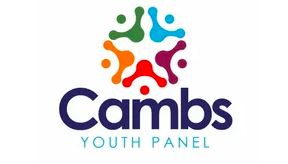
Our motive for getting into this fight was very simple: the schools that our young people attend had been closed through the first of a series of Covid-19 lockdowns. We stood braced for something that we didn’t understand and that we’d never been through before – but we knew instinctively that children and young people equipped with computers were going to fend better than those who didn’t have technology to fall back on.
Almost immediately government directed schools to provide as much education via virtual means as they possibly could. I’ll honestly tell you that I thought the efforts of teachers through that specific period were quite amazing. As empty as the gesture of doorstep clapping now seems (perhaps) – teachers didn’t even get that much credit for their efforts (and their efforts were absolutely vital). The versatility and determination that our teachers showed in using technology that they were broadly unfamiliar with – not only to educate, but to provide children with familiar and reassuring faces and voices – was incredible.
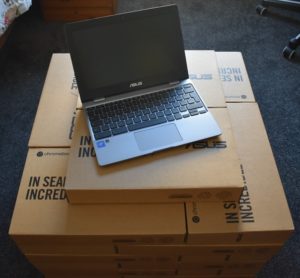
As a group we wanted to do what we could to help that side of the Covid-19 response. We invested whatever money we could get our hands on in affordable technology – we thought that the solution was probably in Chromebooks (we were wrong – but that’s another story). We managed to secure a shipment of 27 devices for about £5,000.
It seemed like a lot of money to us, and it seemed like a whole lot of computers.
In truth – what we hoped would make a big difference only really made a big difference to a few people. Demand vastly outstripped our ability to supply. We fundraised everywhere – we wrote to every COVID relief fund we could find. We were supported by the Police (through the Proceeds of Crime Act), by the Catholic charity Caritas, by the Cambridgeshire Community Foundation, and by the National Lottery ‘Big Lottery Fund’. We joined our efforts with the Cambridgeshire Digital Partnership and that was a significant step forward. I think as a legacy the CDP is a significant asset to the county.
“Raspberry Pi refused to make any profit from our efforts and supplied everything to us at cost. They were amazing.“
Every time we secured a grant we went back out into a market that got tougher and tougher to buy in. The 27 devices we bought from Amazon were priced up to more than £6,500 within two weeks of our first purchase (a shameful £1500 price scalp from the online retailer)!
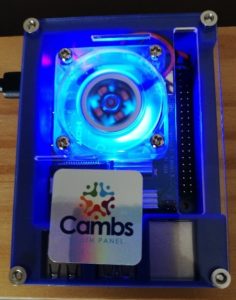
Not only did this breakthrough make it possible for us to increase our distribution massively – it made it possible to advertise computers at an affordable price to those who could find the money. £55 is often doable when £200 – £300 really isn’t. Raspberry Pi refused to make any profit from our efforts and supplied everything to us at cost. They were amazing.
As weeks turned into months, and the months rolled by we passed milestones that we had never anticipated – first one-hundred computers. Then two-hundred and fifty. Then five hundred. The numbers grew and the demand never relented. I don’t really know when we thought we were going to stop – but it gained momentum and we just kept going with it.
“Arm, Cambridge Mechatronics, Qualcomm, Abcam, VoiceAbility, Cambridge Cognition, Costello Medical, Thomson Webb & Corfield Solicitors – so many companies began to work with us”
The prominence of what we were doing received more media attention, many companies responded brilliantly and very generously to our pleas for older equipment that we could renovate and repurpose (desktops, laptops and tablets). Arm, Cambridge Mechatronics, Qualcomm, Abcam, VoiceAbility, Cambridge Cognition, Costello Medical, Thomson Webb & Corfield Solicitors – so many companies began to work with us, donating computers that we could readily turn back into purposeful equipment through low level ‘first pass’ repairs, upgrades or updates
We worked with affordable software – Linux Mint proved to be a very popular and easy to use lightweight operating system. We installed free to use office suites like Open Office and Libre Office. We offered ‘at cost’ upgrades to Windows 10 for as little as £10. We bulk purchased wifi dongles and additional peripherals to save on long term costs.
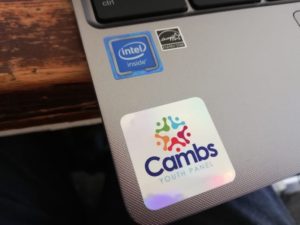
As things grew we had a host of volunteers that helped us with essential logistics – people like John and Faye Dutton a retired couple in South Cambs who not only allowed us to use their storage in the garage, but allowed us free long term access to their vacant business unit so that we could renovate computers there. Andrew Boylett and The Cambridge Bikers group agreed to carry machines to every corner of the county to help us with deliveries. People like Sophie Costello (the founder and CEO of Costello Medical) and Lady Alison de Ramsey drove computers long distances for us in their own cars. Alison Taylor, the MD at Conscious Communications opened the door for us with so many people. It was amazing.
Nobody made any profit off any of these efforts and today we have managed to distribute something in the region of 1400 machines of all types to children, young people, families and to schools.
“We have only just realised that pandemic preparedness is a ‘thing’”
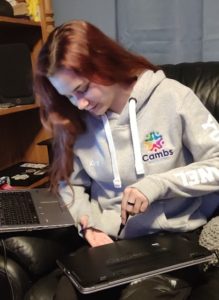
Our efforts are still on-going – quite simply there are still more children and young people who need these computers. Many people question why we are still doing it. The fact is that Covid-19 isn’t over. I’m sure many people would like to think that it is – and I wish that it was – but working in schools I can see the number of young people (teachers and staff too) who are still having to isolate at home. Knowing this is the case – it’s predictable that Mum and Dad and siblings will probably catch it too. It is a highly contagious virus that is still in circulation, Omicron is a more transmissible variant and while the percentage of deaths is lower than the original version of the virus – or indeed the Delta variant that followed – the sheer number of Omicron transmissions means that the risk of future lockdowns is very genuine.
“Covid-19 itself has torn away the veneer of equality that many presume existed in the UK.”
Additionally – we have only just realised that pandemic preparedness is a ‘thing’ that we need to have. When we do emerge from Covid-19 – and we will be quite damaged by it (economically, socially, emotionally, mentally and physically) – we need to ensure that should we be hit by another pandemic (of whatever nature), we have learned from this one. We need to make ourselves more prepared and more resilient. It would be sheer complacency not to. We must now understand how a viral event in the Far East can sweep the globe in a matter of months and stay prevalent for years.
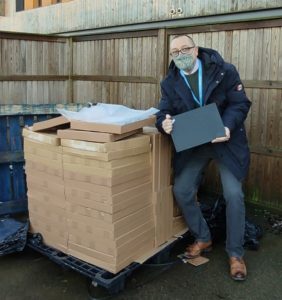
In the 19th century the inequality debate looked at many indicators – but education was a huge one. Different pieces of legislation (broadly ignored by Mill and Factory owners, and largely unenforced in any real sense) tried to reassure us that children of the late 19th century would be given a decent education. Today we have a woolly sense – a vague idea – that all young people do have access to computers and that broadly speaking they are computer literate. We presume that because young people are young that they – by osmosis or some other perhaps genetic ability – instinctively know how to work computers. The children without computers in 2020s Britain are no more computer literate than Victorian children were ‘book’ literate without reading materials. Computer literacy is the new literacy. Coding is the new universal language. Young people may be more adept at learning about computers – they might adapt to new technology more easily – but not if they don’t get access to it.
What we have seen from children and young people who have been given technology over this period is heart-warming and uplifting for us. We’ve been able to get families online in a way that previously they hadn’t been. We’ve been able to move young people away from limited services delivered by phone apps, and from social media dependency – to a full experience of the internet. We’ve seen tears and we’ve experienced amazing gratitude, disbelief and people who can’t understand what we are doing.
“You’re just going to give this to me? What just like that? To keep?! When do I give it back?!”
Young person receiving device
Help Cambs Youth Panel keep going
This blog was written by Phil Priestley, Founder & Lead Adult Facilitator with Cambs Youth Panel. Cambs Youth Panel are a lead partner of CDP.
Find out more about the Cambs Youth Panel and help them continue their brilliant work tackling digital exclusion in Cambridgeshire.